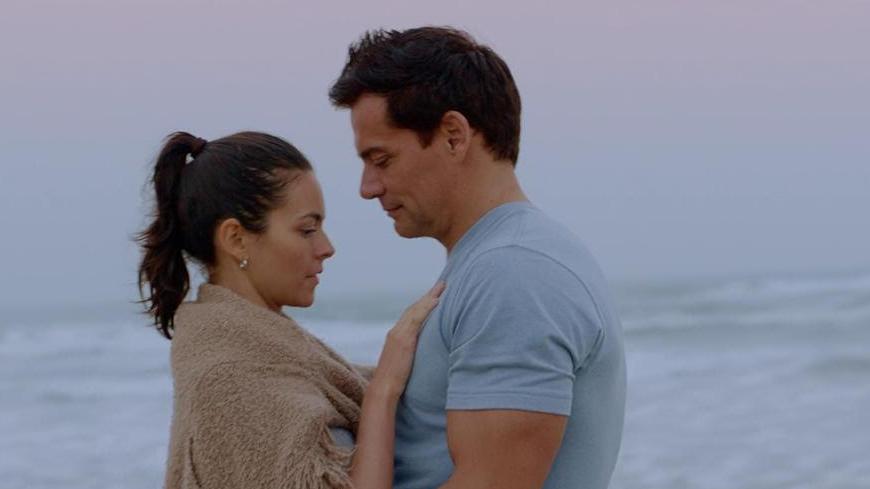It’s easier to forgive a bad film if it means well.
Not every film will meet its filmmaker’s intent. Some will have one or two elements that don’t work – like the acting or the screenplay. Others will be wholesale misfires. Even in the worst-case scenario, as a viewer, you want to believe that the filmmaker set out to tell at least a somewhat interesting story, and something just went wrong along the way. Unfortunate but not indefensible.
Switch Up pushes that basic level of audience goodwill to its shattering point.
The ostensible romantic comedy, which world premieres at the SXSW Festival, follows the obnoxious but popular local television host Ricardo de la Cruz (Cristián de la Fuente) on his improbable and condescending journey of self-discovery. Facing flagging ratings, Ricardo travels to Texas to profile a local soup kitchen run by Cassie Harris (Julieth Restrepo) and her friends. While on location, Ricardo is accused of running a Ponzi scheme and has his assets frozen by the FBI. He ends up living on the streets, relying on Cassie’s kindness to get back on his feet. His time amongst the unhoused and poor community in South Texas changes Ricardo’s outlook on life and opens him up to a new, meaningful romance.
You can probably imagine what Switch Up looks like from the synopsis, and you would be right. The film carries the discomfiting gloss of a Hallmark film: sterile, sharp, and noticeably inexpensive. The critical difference between those films and this one is what lies beneath the flat look. As calculated and templated as they are, Hallmark films and their ilk possess an earnestness that may not be groundbreaking but feels genuine and, most importantly to its legion of fans, well-earned. Switch Up certainly aspires to it, deploying every narrative and visual trick in the book to tug at its audience’s heartstrings, everything from tragic flashbacks to tearful confessions.
There are few genuine or well-earned moments in Switch Up. Its story beats are bizarre and stupid at best, defying even the flimsiest film logic. It asks us to believe that a doctored photo is enough evidence to secure an FBI indictment that would leave Ricardo immediately destitute and that he would have no resources to fight said charges. The film plays fast and loose with time, suggesting that Ricardo is stuck in Texas for either days or weeks, depending on any given montage. The most asinine plot point is Ricardo’s producer, Marie, discovering the set-up early on but getting kidnapped by Ricardo’s nemesis, who claims she checked herself into rehab. At times, the film seems aware of its farcical nature, but the lack of actual laughs and the pervasive foolishness weakens its attempts at self-effacement. The tonal whiplash from toothless comedy to supposedly heartfelt love story cannot be overstated.
It would be relatively harmless if Switch Up were merely an eat-the-rich farce gone terribly wrong. The film skirts into indefensible territory through how it depicts homelessness. Simply put, it is a disgrace, a barrage of condescending, infantilizing, and offensive moments that lean on tropes society should’ve left behind twenty years ago. The film’s most despicable scene is when Ricardo overhears an unhoused little girl asking her mother if they’ll have to sleep outside that night, noting how cold she was the evening prior. The woman hands her daughter a stuffed animal for comfort, and they pray. Even on paper, it’s a viciously manipulative moment. In practice, it’s reason enough to abandon the film altogether. You can practically hear the filmmakers congratulating themselves for treating the unhoused with dignity, not realizing its mockery of one of America’s most pressing social issues.
(To make matters worse, the film introduces a homeless character named Charley, who shepherds Ricardo through his experience as an unhoused man. In his third scene, Charley is revealed to have an illness that effectively puts a clock on his time in the film. However you imagine Charley’s ending, what ends up on the screen is worse.)
Oddly enough, the film’s most successful element is also its least developed: the romance between Ricardo and Cassie. There is no real reason why Ricardo and Cassie fall in love besides plot convenience, but the film finds something resembling a spark between them. With little on the page to support them, Restrepo and de la Fuentes do a lot of heavy lifting. It isn’t impossible to imagine a simpler, less cynical world where Ricardo and Cassie find some sort of common ground that transcends their life circumstances and facilitates a life-affirming connection. Instead, we get asinine plotting and hideous dialogue that eviscerates whatever meager chemistry the central couple scrounges up.
Switch Up doesn’t work on any level. Its failure isn’t the problem, though. The problem is how it, intentionally or unintentionally, leverages positive intent, or “meaning well” to excuse said failure. There is an instinct to grant grace to a film that professes to shine a light on an issue as crucial as homelessness. With its tonal and narrative clumsiness and condescending, borderline offensive depiction of the crisis, Switch Up deserves no such grace. It feels improbable that not one person raised a red flag about this film at some point. The likelihood that no one did suggests a cynicism or lack of care that is utterly reprehensible.
Switch Up had its World Premiere at SXSW 2024 in the Narrative Spotlight section.
Director: Tara Pirnia
Screenwriters: Felice Heather Monteith, Tara Pirnia, Tina Contogenis, Pamela Beach
Rated: NR
Runtime: 105m
Switch Up doesn’t work on any level. Its failure isn’t the problem, though. The problem is how it, intentionally or unintentionally, leverages positive intent, or “meaning well” to excuse said failure.
-
GVN Rating 1
-
User Ratings (0 Votes)
0
A late-stage millennial lover of most things related to pop culture. Becomes irrationally irritated by Oscar predictions that don’t come true.






